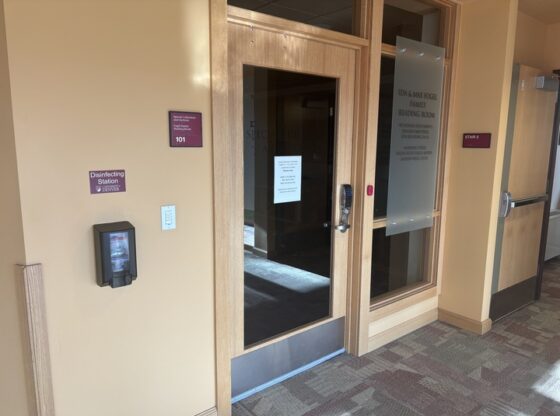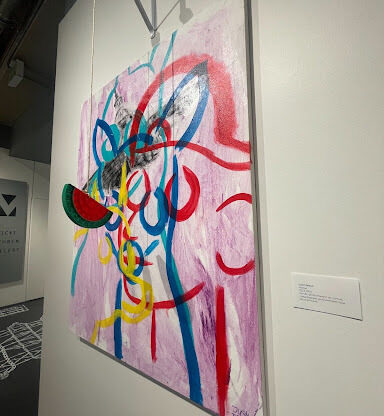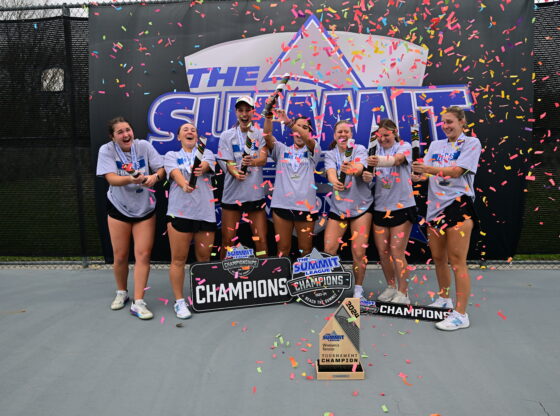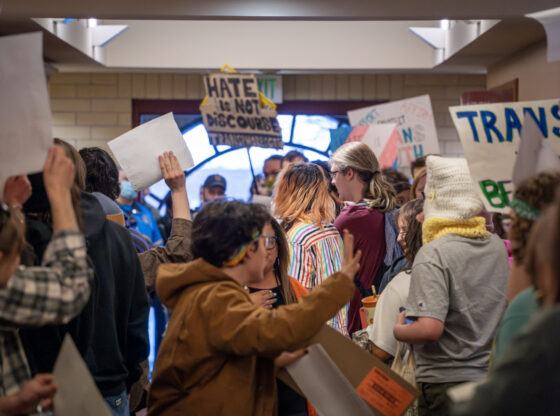Undergraduate and graduate students took part in a two-day eco-connections retreat at the YMCA in Estes Park. This event was co-hosted by the Eco-Conscious Club, Climate Conscious Corps, and the Center for a Regenerative Future (formerly the Center for Sustainability).
While many students knew each other going into the retreat, having come from different programs and areas of discipline, the weekend provided a chance to meet new faces and connect with each other over a passion for the environment, specifically regarding the current climate crisis.
Autumn Harris, a chemistry and biochemistry major at DU, chose to attend the retreat because she never had the free time to connect with nature outside of school.
“I also have a hard time pushing myself outside of my boundaries, to actually connect with nature, so I took this opportunity to be with people I feel comfortable with, while also meeting new people and trying new things,” said Harris.
Asher Reid, a student at the Graduate School of Social Work (GSW) with an ecological justice concentration, spoke about the creative process behind this event.
“I got the inspiration from past retreats outside of DU and wanted to do it with the eco-community because we are all feeling distress and burnout,” they said.
Reid notes that they couldn’t have done it alone.
“I reached out to Korbel folks, social workers and the Center for a Regenerative Future, and people hopped on board, and we just started meeting every week to plan it,” said Reid.
The event started once everyone arrived at the beautiful YMCA in the Rockies. After brief introductions and intention settings, students were invited to eat lunch in the dining hall, provided by the YMCA. Eating together gave everyone a chance to talk about their work in the sustainability industry.
The first two activities consisted of deep reflection in nature.
GSW graduate student JoJo Caranza facilitated an activity called “Beaver and Seeds,” where discussions about beavers, their work ethic and community-driven lifestyles were compared to our own. Students also got a chance to plant their own sunflower seeds in a take-home pot.
History and Public Policy major Kania Campbell took the second half of the group on a nature walk on one of the many beautiful and accessible trails on the campground. During this activity, students picked up items from the ground like sticks and rocks that resonated with them. After some moments of reflection, students combined their findings to create a beautiful nature art piece in the middle of the forest.
This activity provided insight into the impermanence of nature and how we can use it to create something beautiful, without causing any harm. Students were excited and a little nervous to see a mother moose and her baby, just yards away from their artwork.
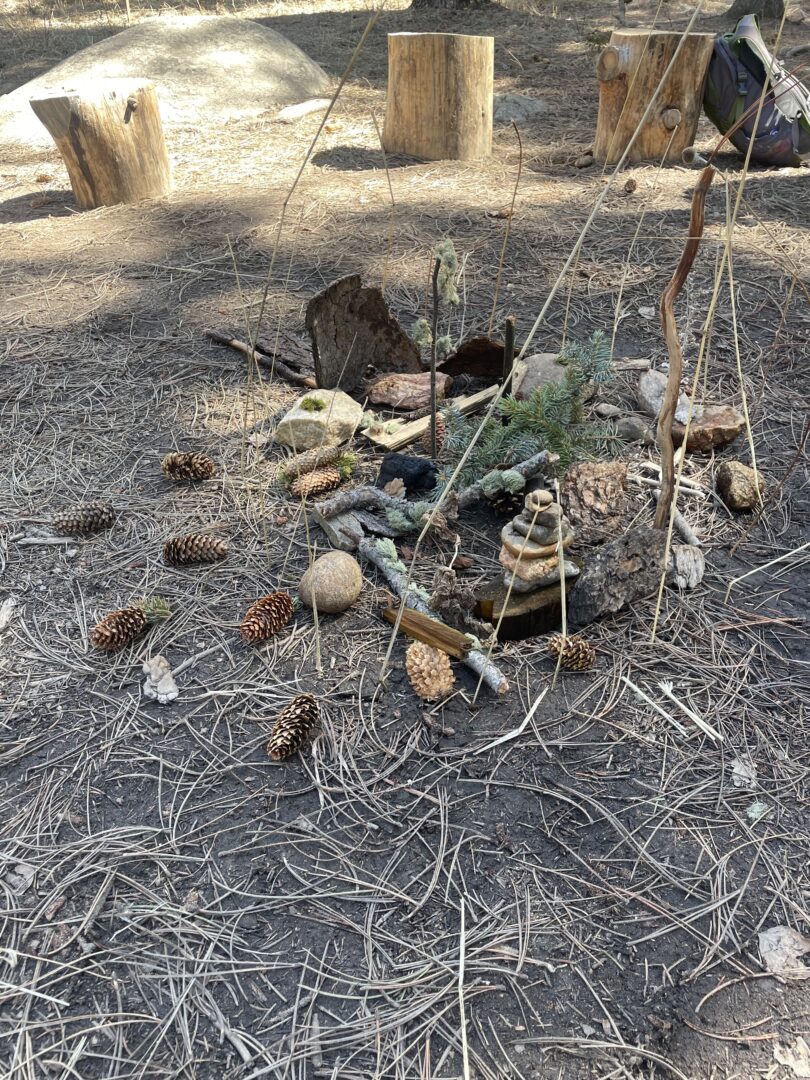
“I loved seeing the moose. It was rare; I feel like it was a big accomplishment for me,” said animal-loving Harris.
After some time outside, either planting sunflowers or creating natural art, we gathered again to talk about the current systems that humans have implemented, and how to dismantle said systems. This allowed for even more community building, resource sharing and more.
The group joined Korbel student Zia O’Neill back outside for a sensory hike and eco-education activity. During this, students spent time locking into each specific sense separately. It’s not every day that you get a chance to smell tree bark and listen to the sounds of the wind. After tapping into our senses, we took 45 minutes to create our regenerative map, which explained through imagery and words how we got into this work and these values.
“Being in nature helps me become more aware of where things originally came from,” said Harris. “It gives you more awareness of the other beings around you and the human impact it has on their environment and living spaces.”
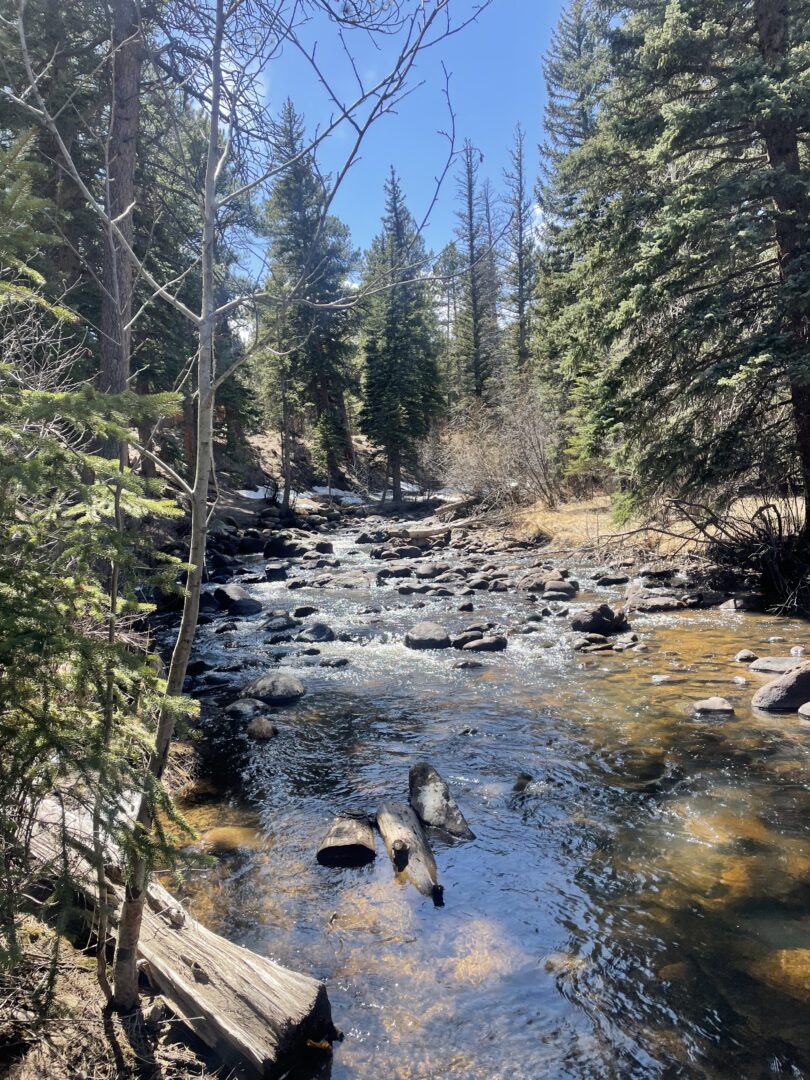
After another wonderful dinner provided by the YMCA, the attendees joined together for a sacred ceremony called “All Beings Council.” In this time of reflection, they removed themselves from their human bodies and embodied another creature, being or element in order to practice empathy.
“I had no clue what to expect [from the ceremony]. I felt gratitude, I felt grief, I felt anger, I felt connected, and it felt really good to do that in a way that was not alone,” said Reid. “I really hope others were able to feel the way they needed to feel too.”
The first night wrapped up with s’mores around a campfire and some free time where students could hike, play games and get to know each other a bit more.
For those who could get themselves out of bed, there was a beautiful sunrise the following morning that provided even more opportunity for reflection and recharging. Reid led an optional elemental breaths and movement activity, while others slept in before breakfast with the entire group.
After some packing and more free time, the students gathered again for community reflection and connection, which was led by O’Neill. In this activity, students wrote down resources, advice and action steps for five different categories: the Circular Economy, further learning, volunteering opportunities, opportunities at DU and support networks. This gave students the ability to share their own knowledge on things that interest them while learning from others about other ways to get involved and take meaningful, collective action.
In regard to the turnout, Reid notes that attendance was double what it was when they put on a similar event during the Fall quarter.
“It was more cross-disciplinary, cross-campus, both undergrads and grads, so that was great,” Reid said.
Students wrapped up the reflective weekend with lunch and a closing circle, where they discussed their biggest takeaways from their time at the YMCA. The attendees all headed home, feeling relaxed and recharged, inspired to make real change in their own communities.
“[I] hope that after doing this, people feel empowered to continue it in their own way within their community so that we can keep building the eco-community and finding ways to pay it forward and continue this process,” Reid said.






